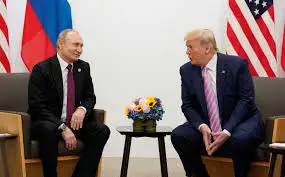‘Russia ready to work with Ukraine on peace accord’: Putin after 2-hour call with Trump

May 20, 2025
In a surprising diplomatic turn, Russian President Vladimir Putin stated that Moscow is open to collaborating with Ukraine on drafting a memorandum that could lead to a potential peace agreement. This announcement followed a two-hour phone conversation with former U.S. President Donald Trump, who has taken on an informal role as a mediator between the warring countries.
The call, which took place on Sunday evening, marks a new chapter in efforts to end the conflict that has persisted since Russia’s full-scale invasion of Ukraine in February 2022. While details of the call remain partly confidential, both Russian and U.S. sources have confirmed that the conversation centered on mechanisms to resume meaningful peace talks and explore common ground.
Putin Acknowledges New Peace Framework
During a televised address following the conversation, Putin emphasized Russia’s willingness to consider a structured memorandum that could form the basis for eventual peace. He noted, however, that any agreement must take into account what he described as the “historical and geopolitical realities” that initially led to the conflict.
“Russia is prepared to engage in constructive dialogue with Ukraine under a framework that addresses the core security concerns of all parties involved,” Putin said. “We appreciate the initiative taken by Mr. Trump and welcome his support for a diplomatic resolution.”
While stopping short of agreeing to an immediate ceasefire, Putin’s comments marked a significant softening in tone compared to previous months. He reaffirmed his view that the conflict stemmed from NATO’s expansion and Western interference in Ukraine’s internal affairs—a narrative that has been widely rejected by Kyiv and its allies.
Trump’s Diplomatic Gamble
Donald Trump, who has publicly expressed his ambition to broker peace between Moscow and Kyiv, described the conversation as “productive” and “encouraging.” Speaking to reporters from his Mar-a-Lago estate, Trump said, “President Putin wants peace. I believe he’s ready to make a deal, and I think President Zelensky is too. My job is to bring the two sides together.”
Trump confirmed that direct negotiations between Russia and Ukraine would restart soon and suggested that neutral venues such as Turkey, Switzerland, or even the Vatican could host the talks. Notably, Trump praised the Vatican for offering to mediate and stressed the importance of a swift ceasefire to prevent further loss of life.
Trump’s re-emergence on the international diplomatic stage has drawn both praise and skepticism. While some applaud his efforts to resolve the bloodiest conflict in Europe since World War II, critics warn that his approach might undermine Ukraine’s sovereignty or prioritize a quick fix over a just peace.
Zelensky Responds with Caution and Openness
Ukrainian President Volodymyr Zelensky also responded to the developments, signaling openness to renewed talks but reiterating the need for a complete and unconditional ceasefire as a precondition for genuine peace efforts.
“Ukraine stands ready to engage in serious negotiations if Russia halts its aggression and withdraws from occupied territories,” Zelensky said in a press statement. “Our goal remains a free, independent Ukraine within its internationally recognized borders.”
Zelensky did not confirm whether he would personally meet Putin but welcomed third-party mediation and indicated his government is reviewing the proposed framework for talks.
European Leaders Voice Concern
The renewed interest in diplomacy has not gone unnoticed in Europe. While most EU leaders welcomed the dialogue, many expressed concern about the nature of any potential agreement.
“There is a risk that this process, if led primarily by the U.S. and Russia, may ignore the legitimate aspirations and territorial integrity of Ukraine,” said German Chancellor Annalena Baerbock. “We support peace—but not at the cost of justice.”
French President Emmanuel Macron echoed similar sentiments, urging that any peace initiative must involve European stakeholders and uphold the principles of international law.
Analysts in Brussels fear that Trump and Putin could prioritize expediency over fairness, possibly proposing a deal that would force Ukraine to cede control of contested areas in the eastern Donbas region or Crimea, which Russia annexed in 2014.
Vatican Emerges as Potential Mediator
Amid the rising momentum for talks, the Vatican has offered to host negotiations between the two nations. Pope Francis, who has repeatedly called for an end to the war, expressed hope that faith and diplomacy could work hand in hand to bring peace.
“We open our doors and our hearts to all who seek peace,” the Pope said in a Sunday address. “The suffering of innocent civilians must end, and we must act swiftly to prevent further tragedy.”
The Vatican’s neutrality and moral authority could make it a viable venue for initiating early-stage talks, particularly if both Putin and Zelensky agree to a symbolic meeting there.
A Fragile Opening, But Real
Despite the flurry of statements and renewed diplomatic channels, the road to peace remains uncertain and fraught with challenges. Ukraine insists on the restoration of its full territorial integrity, while Russia continues to demand recognition of its influence over the Donbas and Crimea.
Nonetheless, the willingness of all sides to restart dialogue represents a meaningful development in a war that has claimed hundreds of thousands of lives and displaced millions.
As observers around the world watch closely, the next few weeks may prove pivotal. Whether this is a genuine opening for peace or a short-lived pause remains to be seen.






